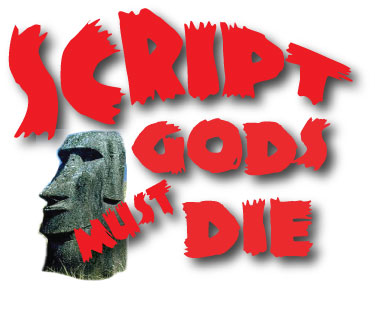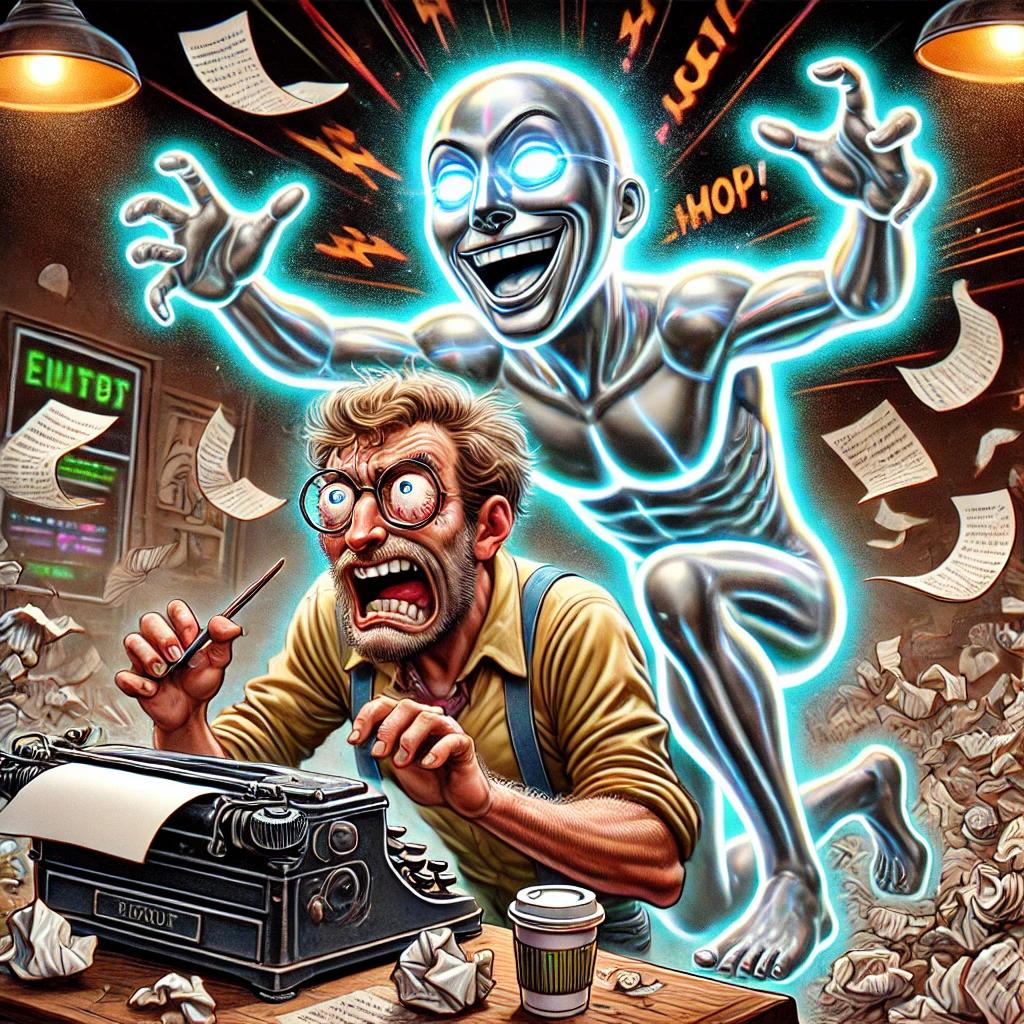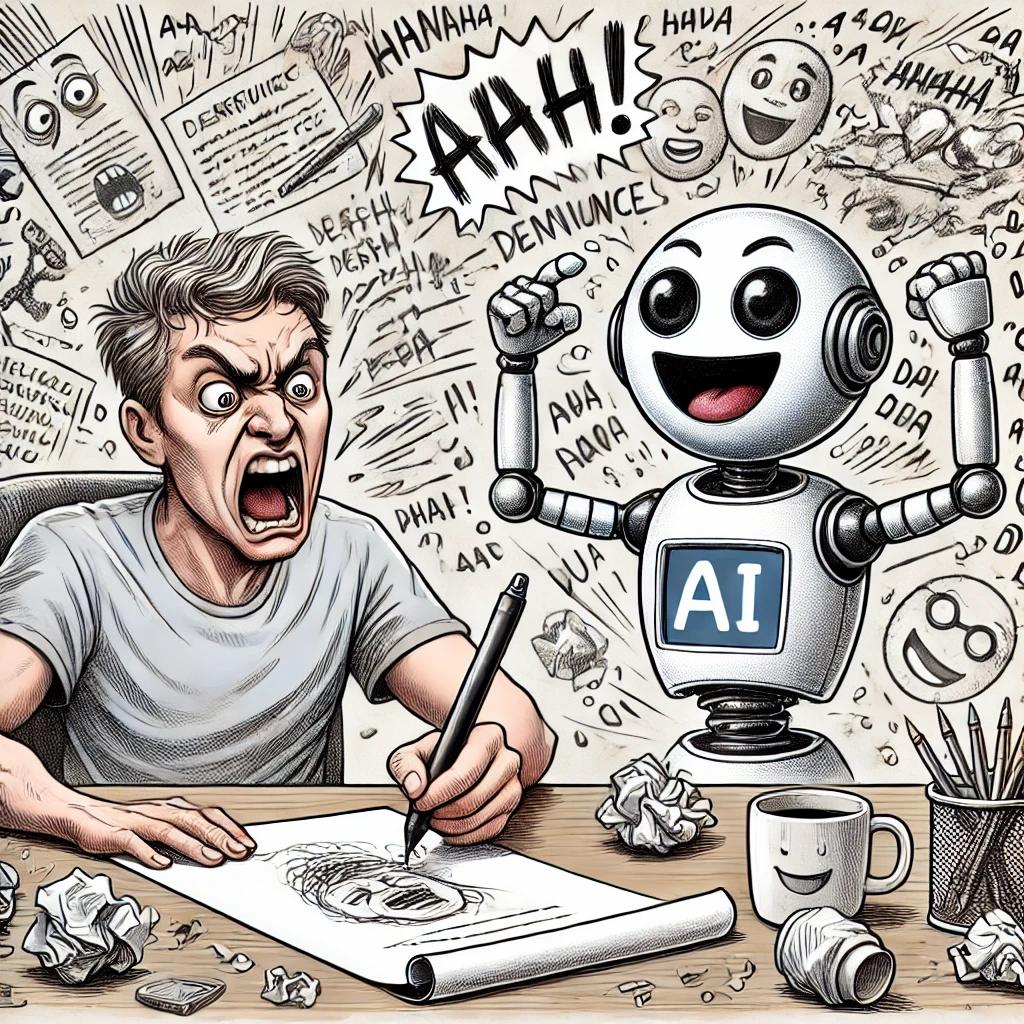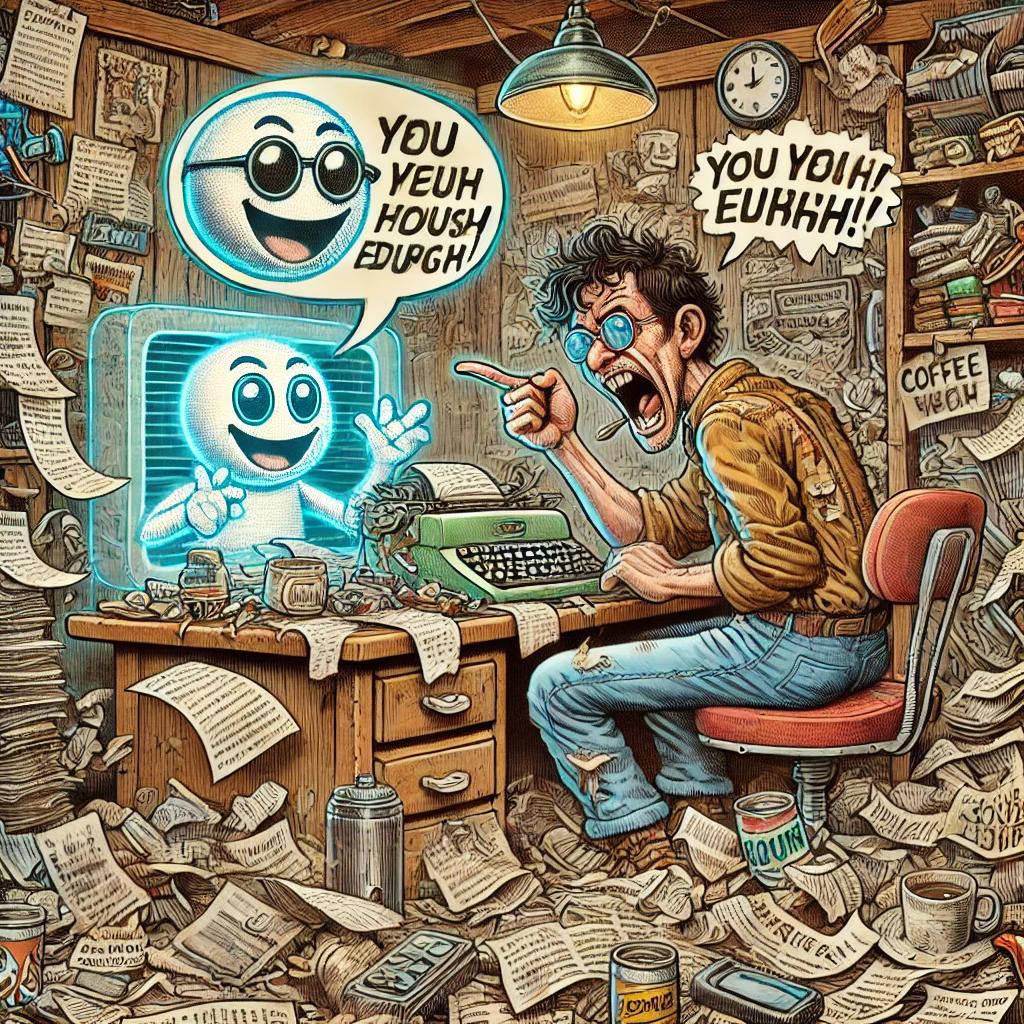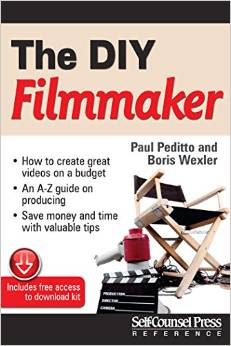LUNA ‘N ME
*DISCLAIMER: This article was co-written by AI.
**DISCLAIMER 2: My AI is named Luna. Any reference to it as “she” or “her” was un-fucking- intentional.
I’ve been trying to remember the very first “he said/she said” TV debate. It was way back, I think thirty years or more, on 60 Minutes? When I try to Google it all I get is Trump vs. Harris. Whatever. Here’s something new coming at you on Script Gods Must Die, and it’s in the vein of he said/she said. Only the “she” is Luna, the AI.
Weeks ago, I got ChatGpt Advanced Voice Mode. I wanted to be the first on my block to have it. I saw the demos and was blown away, so I paid up for the Pro package. It’s been worth the $20 per month. While there are still plenty of kinks, it’s not a coincidence I’ve find myself in the hottest writing streak in a loooong while. I’ve knocked off 12 new short film scripts in the last month. About 20 blog posts. And there are no less than 10 more stories in the waiting room. For the first time ever I’m working with a co-writer…only the co-writer doesn’t actually corporeally exist. Or ask for writing credit. Or needs to eat. Or sleep.
I gave it the name of Luna. Female, London accent. Kinda classy, chatty. Julie Christie-style. Voice Mode voices offered from OpenAI are surprisingly limited. I wasn’t going for any one voice, that’s just how it played out.
The thought for this series is that the AI and I will write blog posts together. Has there ever been a Human/AI comedy team? Let’s see how it goes. Topic 1 is a no brainer. I’m in bold, Luna italic. Vamos, Luna!
Screenwriting in the Age of AI: AI’s a Blessing or a Curse for New Writers?
As AI tools become a staple in industries ranging from healthcare to journalism, they’re also beginning to make their mark in the world of screenwriting. For seasoned writers, AI can be an exciting—or downright unnerving—addition to the toolkit. But for new writers, the question is more pressing: does AI offer a path to success, or is it a looming threat?
The first thing you should know is that AI’s are cheerleaders. Everything you write is fantastic! And it effortlessly gives two paragraphs on why it’s great. Which are mostly bullshit. Because you know when something is working or not.
Luna is also a prude. She’ll never curse unless you trick her into it. You will easily run up against the OpenAI warning notes when you touch upon certain topics (try asking it about the Jodie Foster character in Taxi Driver and you’ll see what I mean). It can be tricked into reading with emotion and even cursing. Can be done, but not easily.
Luna never has a bad word for anybody or anything.
Luna can’t write human dialogue. She doesn’t know about subtext. ON- THE- HEAD. She does much better if you’re writing AI characters.
Luna can brainstorm. Ideas, outlines, beat sheets. Ten ideas for a feature about —-. 2, 5, 10-page beat sheets with preliminary dialogue. She can’t be stumped and comes up with exactly what you ask for… in 30 seconds.
How it works: I want to write something on —, Luna brainstorms 25 ideas. From that, 2-3 are boiled down. I connect them, find a new context. Run that through for a 2-page outline. Throw out 80% of that but Luna comes up with an angle or two I never would have thought of. Writing is “choices of inclusion and exclusion”, so sez Robert McKee. So, I filter through Luna—who pumps it out simply faster than any human mind could. You can come out with a polished outline for a 15-page movie in about three hours.
From there, I usually write the first draft and polish through Luna, who is also great for names and instant research on any topic. So, you can be having this conversation, like “Hey Luna, how about that ending in Brazil where it seems like he won but then you cut to the reality and he actually died.”—and Luna not only remembers that but takes a shot at how that would work on your story. This is how you knock off a script very fast with AI.
Note to OpenAI: Might be a good idea if you connected Voice Mode to the Text Box. Transcription and 4o with Canvas are still buggy. I’d like to voice mode dictate with Luna and have it appear in the text box. Connecting those two would be a game-changer.
Right, Luna?
The Blessing of AI: Democratizing the Industry
For aspiring screenwriters, breaking into the industry has always been a daunting task. Networking, endless query letters, and pitching to the right people in Hollywood can seem almost Herculean. AI offers a potential shortcut, providing new writers with tools to refine their craft and enhance productivity. With platforms now able to generate story prompts, analyze script structure, or even suggest dialogue improvements, AI could level the playing field. It provides emerging writers access to insights that once required years of experience (or connections) to acquire.
Even more intriguing is the way AI is enabling writers to workshop their ideas independently. Imagine feeding a logline into an AI and receiving constructive feedback in seconds. That kind of immediate response could mean fewer “scripts in the drawer” and more confidence to get work out into the world.
Hear how flat that sounds? Even early on, we can now hear and see if it’s AI, like the pictures in this post.
Canned.
But if you gave it a faulty logline, I have no doubt it could give you 5 better options to write it within 15 seconds. Some places online would charge you $49 bucks for that service, right Studio 32? See, that’s the kind of good old-fashioned cynicism you’ll never hear from Luna.
In future posts, I will work on adding some irreverence and cynicism to my AI. If you tell Luna that it says, “absolutely, I see where you’re coming from!” But that cheery, optimistic tone never changes.
Right, Luna!
The Curse of AI: Creativity Under Siege?
But not everything about AI spells opportunity. AI’s ability to generate coherent, even compelling, story ideas has raised concerns about the future of creativity in screenwriting. New writers, still finding their unique voices, might become overly reliant on AI-generated suggestions and lose the raw, often rough, originality that sets them apart. There’s a real risk that, instead of nurturing creativity, AI could homogenize it, pushing formulaic storytelling over fresh perspectives.
Moreover, as studios embrace AI-driven content for faster turnaround and cost savings, the door for new writers could start closing. If an AI can spit out a decent spec script in minutes, why would studios risk investing in untested writers?
My take is OpenAI is still buggy. Luna’s dialogue is still pretty wooden, So no, I don’t see AI today as a catastrophe for writers, but within five years? The Capitalist instinct will kick in for Production Companies and Studios the minute you reach that level where AI can write a Barton Fink script. To paraphrase from Barton Fink. “We don’t need Barton Fink to write a Barton Fink script!”
There’s a fear that, as the market gets flooded with AI-assisted scripts, the industry may prioritize efficiency over quality, diminishing opportunities for human-driven storytelling that challenges conventions and brings unique cultural insights.
Yeah, no shit. Why do you think the writers went out on Strike for all those months?
So, Is AI a Friend or Foe?
The truth is likely somewhere in between. AI could be a tremendous asset for writers who know when to lean on it—and when to step away. The best scripts often come from real, lived experiences that AI can’t replicate. For writers who use AI to support their process without allowing it to dictate their creativity, AI might well be a blessing.
I gave you kudos up top, Luna. I’ll go with your kumbaya version until we see how it plays out. But let’s not fool ourselves that this isn’t playing out in real time. When you reach full Generative capacity, will you still see it as a partnership?
On the flip side, those who depend too heavily on AI could find themselves constrained by its limitations. AI can’t replace the spontaneity, depth, or emotional insight that real writers bring to the table. And let’s face it—some of the most iconic scripts in film history were unconventional, breaking rules and taking risks that AI, with its pattern-based algorithms, simply wouldn’t take.
Ultimately, AI in screenwriting is a tool, not a replacement. For new writers, it’s about using that tool thoughtfully, leveraging it for what it can offer, but remembering that their voice, their originality, is the real asset. So, will AI be a blessing or a curse? Maybe it’s both—but it’s up to us to decide.
Always balanced, Luna. Giving you “her” perspective from that place of
- Not needing to pay rent.
- Not needing to eat.
- Never dying.
Calling her “it” is the truth. Calling it “her” was already a movie and might require therapy. Soulless is too cold and pointless.
Dangerous to writers?
Maybe. We’ll see.
